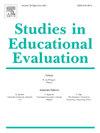当学生对教学的评价不再是指示性的:心理学学生的课堂体验、动机因素和未来选择
IF 2.6
2区 教育学
Q1 EDUCATION & EDUCATIONAL RESEARCH
引用次数: 0
摘要
学生教学评价(set)在教育机构中被广泛用于评估教学质量,但对其潜在负面影响的担忧日益增加。我们开发了一种新的SET工具,在整个学期中多次使用,侧重于学生可以有意义地评估和教师可以在大型心理学课堂上采取行动的方面。通过对883名学生的数据进行因素分析,我们发现了5个不同的因素。积极学习因素对成绩有正向预测作用。归属感与包容、生产性提问和基本理解因素预测学生的课后归属感。基础理解和生产性提问也预测了未来的课程选择。有趣的是,作为当前许多SET问卷的核心内容,感知效能与课程成绩和未来课程选择呈显著负相关。鉴于出现了反对当前set的有力证据,当前工具中的行为重点提供了一种可能的前进方向。本文章由计算机程序翻译,如有差异,请以英文原文为准。
When student evaluation of teaching is no longer indicative: Psychology students’ in-class experience, motivational factors and future choices
Student evaluations of teaching (SETs) are widely used in educational institutions to assess instructional quality, but concerns about potential negative effects are growing. We developed a new SET instrument, administered multiple times throughout the semester, focused on aspects students could meaningfully evaluate and instructors could act upon in large lecture psychology classrooms. Factor analyses of data collected from 883 students across three different psychology courses, we identified five distinct factors. An Active Learning factor positively predicted grades. Belonging and Inclusion, Productive Questioning, and Basic Understanding factors predicted students' post-course sense of belonging. Basic Understanding and Productive Questioning also predicted future course selections. Interestingly, Perceived Effectiveness, which represents the core content of many current SET questionnaires, showed significant negative associations with course grades and future course choices. In light of the strong evidence emerging against current SETs, the behavioral focus in the current instrument offers a possible way forward.
求助全文
通过发布文献求助,成功后即可免费获取论文全文。
去求助
来源期刊

Studies in Educational Evaluation
Multiple-
CiteScore
6.90
自引率
6.50%
发文量
90
审稿时长
62 days
期刊介绍:
Studies in Educational Evaluation publishes original reports of evaluation studies. Four types of articles are published by the journal: (a) Empirical evaluation studies representing evaluation practice in educational systems around the world; (b) Theoretical reflections and empirical studies related to issues involved in the evaluation of educational programs, educational institutions, educational personnel and student assessment; (c) Articles summarizing the state-of-the-art concerning specific topics in evaluation in general or in a particular country or group of countries; (d) Book reviews and brief abstracts of evaluation studies.
 求助内容:
求助内容: 应助结果提醒方式:
应助结果提醒方式:


